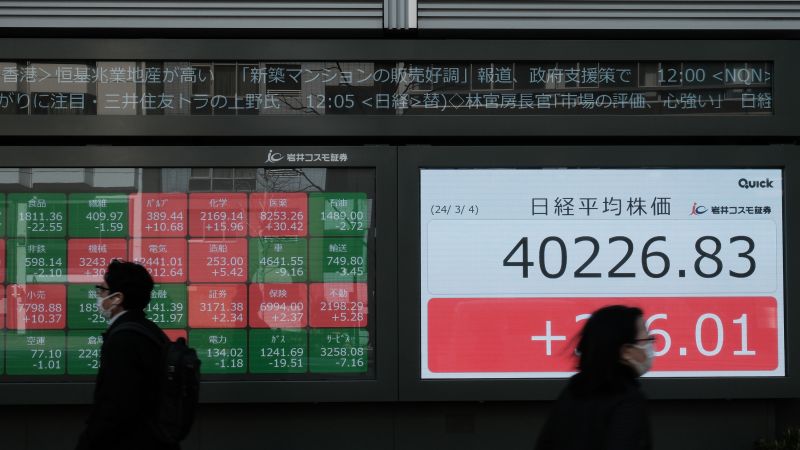Asian Markets have started the week on an upbeat note.
Japan’s Nikkei 225 index jumped above 40,000 for the first time on Monday, extending a historic rally that analysts say has just begun.
The milestone comes just days after it had set a record closing high of 39,098.68, eclipsing its previous 1989 peak.
The Nikkei index, which was up 0.5% on Monday, has been on a tear for more than year, driven by a combination of strong corporate earnings, a weaker yen that helps exporters, and an influx of foreign investors looking for an alternative to China’s depressed markets.
“We expect Japan to be one of the top performing markets between 2023 and 2030,” said Jefferies analysts in a research report on Sunday. “The great shareholder return story in Japan has begun.”
The Nikkei has surged more than 20% this year, making it the best performer among major equity indexes in the world.
Monday’s rally follows a surge in US stocks late last week. The Nasdaq and the S&P 500 both hit new record highs on Friday, fuelled by a boom in chipmakers and artificial intelligence stocks.
Optimism regarding semiconductors boosted Taiwan’s stock market as well, with benchmark Taiex hitting an all-time high on Monday, led by Taiwan Semiconductor Manufacturing Company.
The world’s largest contract chipmaker was up 5.2% as it is is the main manufacturer of AI chips for companies such as Nvidia.
Elsewhere in the region, South Korea’s Kospi gained 1.2%, while Hong Kong’s Hang Seng shed 0.5%.
Mainland Chinese stocks were trading cautiously higher, as investors await the upcoming annual gathering of the National People’s Congress (NPC), the country’s rubber-stamp legislature, which will draw nearly 3,000 delegates to Beijing for the next seven days.
Premier Li Qiang is set to announce China’s 2024 growth target on Tuesday and is also likely to unveil more stimulus measures to revive the sagging economy.
The Shanghai Composite Index was up 0.3%.
“[The NPC meeting] holds significant implications for the trajectory of assets in China for 2024 and beyond,” said Stephen Innes, managing partner at SPI Asset Management.
“The announcements and policies unveiled during the parliamentary session will provide crucial insights into China’s economic priorities, strategies, and potential market developments, shaping investor sentiment and asset allocation decisions domestically and globally,” he said.
Chinese policymakers face mounting challenges to boost a flagging economy, including how to stabilise the property sector, counter deflationary pressures, reverse foreign capital outflows, and save a battered stock market.
Analysts widely expect the policymakers to set this year’s growth target at around 5%.
Last week, the Communist Party’s Politburo, its top decision-making body, pledged to meet economic growth targets for 2024 by spurring domestic demand and boosting tech and innovative industries.
In 2023, China’s economy expanded 5.2%, meeting the official target.
Read the full article here








